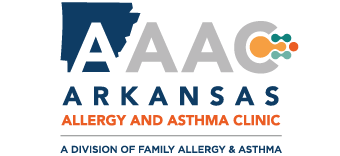5 Common Myths About Seasonal Allergies
 If you experience sneezing, coughing, and watery eyes during the spring or fall, then you may have allergic rhinitis, more commonly known as seasonal allergies or “hay fever.” Many misconceptions surround seasonal allergies, so learn more about these five allergy myths to understand this common condition better.
If you experience sneezing, coughing, and watery eyes during the spring or fall, then you may have allergic rhinitis, more commonly known as seasonal allergies or “hay fever.” Many misconceptions surround seasonal allergies, so learn more about these five allergy myths to understand this common condition better.
Myth #1: Moving to a new location gets rid of allergies.
You have probably heard this at least once, but it is not true.
Tree pollen, grass pollen, weed pollen, and mold trigger seasonal allergies, and these exist everywhere in the country. Attempting to escape seasonal allergies in Little Rock by moving to the Arizona desert, for example, means you may react to new grasses and weeds and experience the same set of problems.
Moving is not likely to lower your risk of allergies. You would be better off speaking to a specialist at your local asthma and allergy clinic about treatment options than uprooting your life in Little Rock.
Myth #2: Eating local honey will ease allergy symptoms.
This sounds good, but it too is false. Consuming local honey does not help ward off your allergies.
The concept behind the honey theory is similar to that of immunotherapy. Local honey contains local pollen, and consuming it gradually exposes your body to the allergen, thus helping build your immunity. Although honey does indeed have local pollen, it is usually not from the types of plants to which people are allergic, meaning you are left with a tasty placebo.
Environmental allergens are caused by the pollen of trees, grasses, and ragweed. Bees, however, use pollen from flowers, which do not typically trigger allergy symptoms.
Immunotherapy (such as allergy shots) takes a much more targeted approach. Allergists expose you to the specific allergens that trigger your allergic reaction, and gradually increase your exposure to reduce your response to it. Contact our asthma and allergy clinic in Little Rock for more information about allergy shots.
Myth #3: You cannot develop allergies if you did not have them as a child.
Allergies come and go. If you experienced allergies as a child, then there is a small possibility you could outgrow it in adulthood. Likewise, you could develop seasonal allergies as an adult when you have never had them growing up.
If you move to a new location, for example, then you may be exposed to new allergens and develop allergies, and adult-onset allergies can occur at any age. When your body is exposed to something like pollen or mold, your body can mistake it as harmful. Then your body releases chemicals like histamines that cause allergy symptoms like a runny nose, itchy eyes, and coughing.
New allergy sufferers may benefit from over-the-counter allergy medications and trigger avoidance, but if they do not provide relief, then you should visit an allergy clinic. Allergists may recommend allergen immunotherapy, various medication options, and education about how to live with allergies.
Myth #4: Only take allergy medicine when you have symptoms.
Some allergy medicines work by stopping your immune system from producing chemicals that create allergy symptoms. They help reduce inflammation and can actually do better when taken over long periods. Beginning allergy medication about two weeks before allergy season starts is one way to fight the coming pollen storm.
We also recommend learning your specific allergy triggers. You can do this by visiting an allergy clinic and getting tested. Once you know your triggers, you can plan your allergy medication schedule around when those pollens bloom.
In addition to preemptively taking allergy medications, you may also want to follow other precautions such as avoiding going outdoors when it is dry and windy and avoiding outdoor activities in the morning when the pollen count is highest. Avoid outdoor activities that can exacerbate allergic reactions, such as mowing the lawn. If unavoidable, showering, and changing clothes immediately after yard work can reduce your pollen exposure.
Myth #5: Flowers trigger allergies.
Most individuals do not have allergic reactions to flower pollens. Some people may react to flowering trees, but cut flowers are not usually responsible for this. An appointment with an Arkansas Allergy and Asthma Clinic can identify your specific allergen triggers.
Although the pollen count does not suggest how you will feel on a particular day, it can be useful for telling you the prominent pollens in the air. By keeping note of the pollen counts, you can better understand what days are better for outdoor activity.
Find an asthma and allergy doctor near me
Contact Arkansas Allergy and Asthma Clinic to schedule an appointment with a doctor for seasonal allergy relief today.


